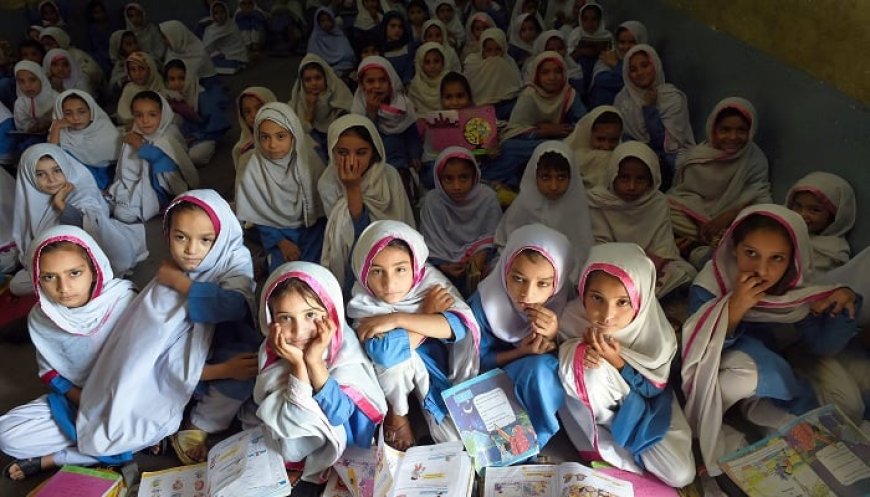International Day of Girl Child: Pakistan renews pledge to empower its daughters

1. "Our daughters have power to change world. Move forward, we are with you," says CM Maryam Nawaz in special message
As the world observes International Day of the Girl Child 2024, highlighting the critical need for empowerment and rights, alarming new statistics reveal a rise in sexual violence against girls, particularly in countries like Pakistan, where access to education, healthcare, and safety remains a struggle.
UNICEF estimates indicate that over 370 million girls and women globally have experienced rape or sexual assault before turning 18, underscoring the urgent need for action. The first-ever global and regional estimates on sexual violence against children reveal the extensive scope of these violations, especially for adolescent girls, which can have lifelong consequences.
When including 'non-contact' forms of sexual violence, such as online or verbal abuse, the number of affected girls and women rises to 650 million worldwide—about 1 in 5—highlighting the need for comprehensive prevention and support strategies to address all forms of violence and abuse effectively.
“Sexual violence against children is a stain on our moral conscience,” stated UNICEF Executive Director Catherine Russell. “It inflicts deep and lasting trauma, often perpetrated by someone the child knows and trusts, in places where they should feel safe.”
Pakistan is also observing this day with a commitment to intensify efforts to empower girls and raise awareness about their rights while addressing the challenges they continue to face.
**“Power to Change the World”**
In a passionate message for the day, Punjab Chief Minister Maryam Nawaz remarked, “The courage, determination, and talent of our nation's daughters have the power to change the world. We are with you as you move forward.” She emphasized that nurturing the dreams and abilities of daughters is not only their right but also a national duty, highlighting that the Punjab government is implementing a comprehensive roadmap for the protection, education, health, and welfare of girls and women.
“I hope every daughter can turn her dreams into reality with the support of society,” she added.
For many young girls growing up in Pakistan, there are few women in power to look up to and rely on for protection of their rights. The underrepresentation of women in the workforce further hinders girls’ access to essential services like healthcare and education, as they often feel more comfortable in environments where women are present.
Sindh Governor Kamran Khan Tessori echoed this sentiment in his message, stating, “Empowering girls is the foundation of societal progress. It is our foremost responsibility to provide opportunities for girls to excel in every field. Through education and protection, we can secure a bright future for them.” He emphasized that promoting girls' talents is crucial for the country's development.
Currently, an estimated 53% of the more than 25 million out-of-school children in Pakistan are girls, contributing to a labor force where women are significantly underrepresented. The female labor participation rate in Pakistan is just over 24%, compared to around 80% for men, with women making up only 5.71% of legislators, senior officials, and managers, according to the World Economic Forum’s Global Gender Gap Report.
**“Girls’ Vision for the Future”**
The United Nations General Assembly adopted Resolution 66/170 on December 19, 2011, to designate October 11 as the International Day of the Girl Child, recognizing girls' rights and the unique challenges they face worldwide. This year's theme, "Girls’ Vision for the Future," conveys the urgent need for action and persistent hope, fueled by girls’ voices and aspirations.
Today’s generation of girls is disproportionately impacted by global crises, including climate change, conflict, and poverty, as well as setbacks to human rights and gender equality. Many girls are still denied their rights, which restricts their choices and limits their futures.
However, recent analyses show that girls are not only resilient in the face of crises but also hopeful for the future. They are actively working to realize a vision of a world where all girls are protected, respected, and empowered.
But girls cannot achieve this vision alone; they need allies who will listen to and respond to their needs. With the right support, resources, and opportunities, the potential of the world’s more than 1.1 billion girls is limitless. When girls lead, the impact is immediate and far-reaching—strengthening families, communities, and economies, and brightening our collective future.
It is time to listen to girls and invest in proven solutions that will accelerate progress toward a future where every girl can fulfill her potential.


















































